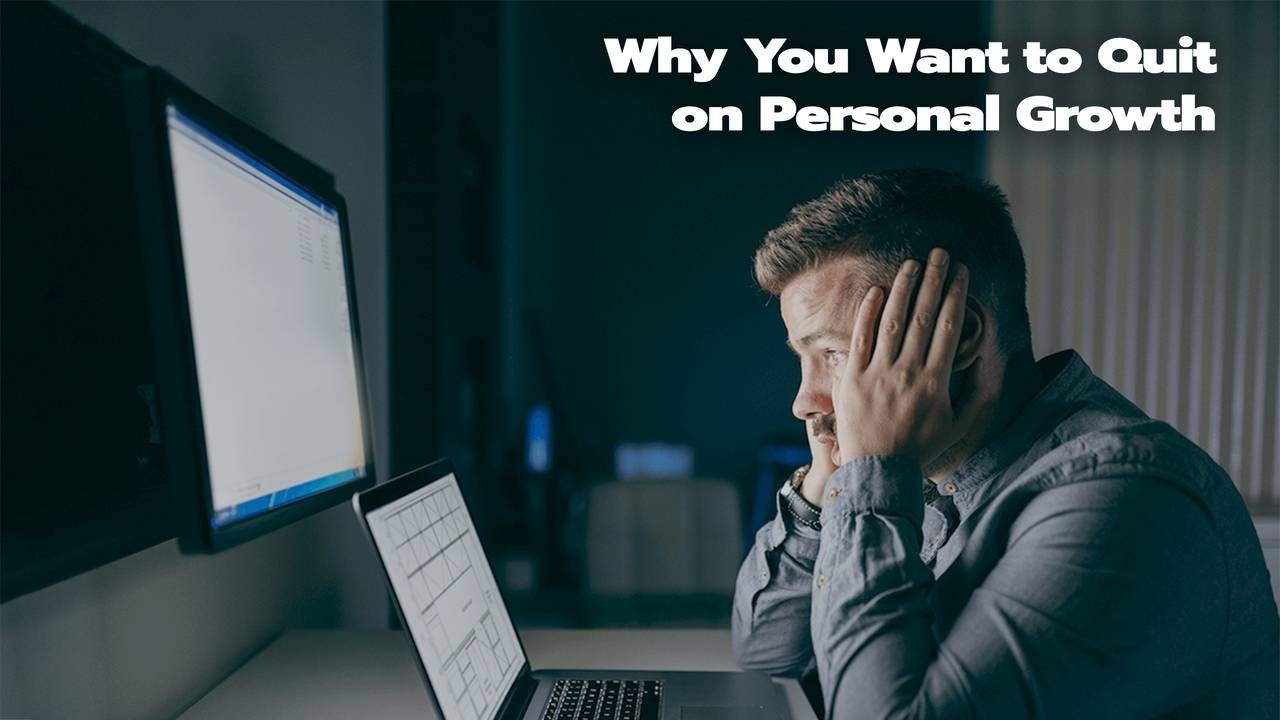Why You Want to Quit on Personal Growth

Intentionality is your secret weapon in your war on mediocrity.
—Brian Moran & Michael Lennington, The 12 Week Year
I love the psychology of change and personal growth – maybe it’s because I’m slightly obsessed with unlocking human potential and seeing what we can evolve into.
One thing I’ve studied more closely than ever these past 18 months is what personal growth really entails – and what makes people quit on a good thing (and themselves) and sends them scampering back to their familiar comfort zone, tail between legs.
Every day people decide on goals they want to bring to life – but do not get clear on whether the psychological cost involved (temporary stretching beyond the comfort zone) is outweighed by actually achieving it.
This is a big mistake.
Many also don’t take the time to formulate a powerful vision of what they want and WHY they want it.
This is paramount. You will need sufficient inspiration to get there.
These preparatory steps are essential to give yourself the best chance to make significant positive change/personal growth – and turn it into your new normal.
There are a few primary psychological stages people move through when they attempt change, whether in business or personal life,:
Psychologists Kelley and Connor have formulated and outlined the “Emotional Cycle of Change”1 (ECOC) as follows…
The Emotional Cycle of Change
Phase 1: Uninformed Optimism
Here we’re feeling good about our goal and vision, seeing all the potential benefits and none of the negatives or costs. We don’t really realise what we’re in for!
Phase 2: Informed Pessimism
Here the costs of change start to become apparent and our emotions take a nosedive south. We’re questioning if it’s really worth the effort, looking for reasons to sabotage our efforts and return to the comfort zone we are biochemically addicted and habituated to.
Because we’re engaging in new thoughts and new behaviour patterns, this means a new neurotransmitter cocktail is being generated by your limbic brain. Your old neuro-cocktail was probably very well established and your body’s cells were more than merely accustomed to it – they were a little bit addicted!
Our cells are now screaming “No, this doesn’t feel right, wrong way, go back!” Heard that one before from someone in a liminal space?
It’s important not to listen to your cranky addict cells! This is just your subconscious mind talking, but you need to choose to live from creative wilfulness and that means acting consciously, from your frontal lobe, the most evolved part of the brain.2
Phase 3: The Valley of Despair
Where most people give up and quit on themselves. All the pain of change is apparent and the benefits seem distant and abstract. The whole endeavour looks futile – what we were thinking trying to grow and up-level our lives?!
Having a crystal clear vision and reason WHY is absolutely CRUCIAL for surviving the Valley of Despair. This is the raw emotional fuel to sustain your commitment.
You also need a rock solid mindset to stay focused and on task, implementing your day-to-day tactics while keeping an eye on the Big Picture. You’ll also want to acquire a relevant SKILL set and even a mentor to help navigate your way out of the Valley to the fourth stage…
Phase 4: Informed Optimism
Now you’re starting to feel good again and your work is starting to yield some results. Importantly, here your new thought patterns and actions are more routine and therefore producing LESS discomfort.
You’re adapting and now is not the time to stop!
Your chances of success here have improved significantly.
Phase 5: Success and Fulfilment
Now you get to reap the harvest you’ve sown and enjoy the benefits of your prior discomfort. The rewards of change are apparent and the costs are becoming a distant memory.
Congratulations, you’ve completed the Emotional Cycle of Change in spite of yourself!
You’re a new person with new neural networks, serving up new neurotransmitter cocktails to your body’s cells, and now they’re loving it (as opposed to hating you for it) and will help you maintain your new state of being!
You have a new normal.
Time to head down to the local kombucha bar and reward yourself with a cold one.
Too many times a new opportunity shows up and we optimistically jump in, sensing a way to improve some aspect of our life…
…without even a rudimentary grasp on how to navigate the challenges we will inevitably face along the way as we push beyond our comfort zone and encounter the internal resistance that comes with that.
Understanding the ECOC can help us prepare to enter the battleground of meaningful personal growth and change and give ourselves a fighting chance.
Have at thee, evolution!
REFERENCES
- Source for the ECOC model: The 12 Week Year by Brian Moran and Michael Lennington
- Evolve Your Brain, Joe Dispenza


